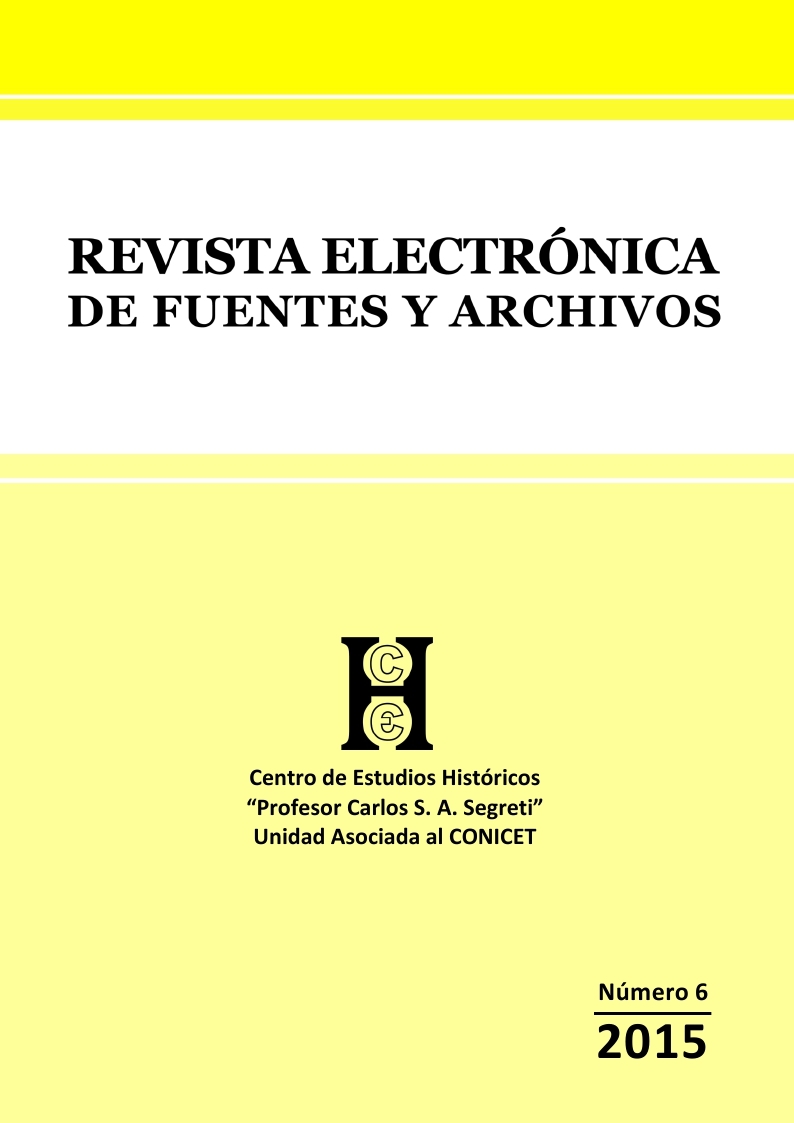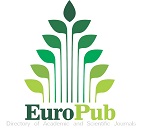The logics of the archive make history: the sources of the police and the Compañía de Jesús in the Archivo General de la Nación
Keywords:
archives, police, jesuits, sourcesAbstract
A set of sources concerning the police and the Society of Jesus allows us to confirm that the narrative in history follows the way they were organized. In the case of the police, there is an immediate connection between knowledge and volume of the sources. The vast number of documents in the AGN in the 1820s is due to the penetration of a new knowledge in order to create a state. The return to a local government from 1829, meanwhile, shows a judicial culture that still remained in the framework of a world without State. The Jesuit documents, in turn, generated to control the activity of their members, ended up being successful in a different context, because they provided a detailed description of the rural world. However, the transfer of these documents from a Jesuit to a national rationality began the process of distortion of the source. The consistency on the origin of these documents allowed historians to create for decades new knowledge.
Downloads
References
AGÜERO Alejandro, “El testimonio procesal y la administración de justicia penal en la periferia de la Monarquía Católica, Siglos XVII y XVIII”, Fontes, núm. 1, 2014.
AMARAL Samuel, “Trabajo y trabajadores rurales en Buenos Aires a fines del siglo XVIII”, Anuario del Instituto de Estudios Histórico-Sociales, núm. 2, Universidad Nacional del Centro de la Provincia de Buenos Aires, Tandil, 1987.
BISCHOFF Efraín, “Los jesuitas y Córdoba”, Archivum, t. 9, Buenos Aires, 1967.
CALABRÓ Norberto “Archivo General de la Nación (1821-1996)”, Buenos Aires, Parthenon, 1996.
CHEVALIER François (comp.), Instrucciones a los hermanos jesuitas administradores de haciendas, México, UNAM, Instituto de Historia, 1950.
CHEVALIER François, Land and Society in colonial Mexico. The Great Hacienda, Berkeley and Los Angeles, University of California Press, 1970.
CONDE NARANJO Esteban, “Libros de policía, policía de libros. España, 1800”, Quaderni Fiorentini per la storia del pensiero giuridico moderno, núm. 35, 2006.
DUBBER Markus D., The police power. Patriarchy and Foundations of American Government, New York, Columbia University Press, 2005.
EWALD Ursula, Estudios sobre la hacienda colonial en México. Las propiedades rurales del Colegio Espíritu Santo en Puebla, Wiesbaden, Steiner Verlag, 1976.
FRADKIN Raúl, “La historia agraria y los estudios de establecimientos productivos en Hispanoamérica colonial: una mirada desde el Río de La Plata”, Raúl FRADKIN (ed.), La historia agraria del Río de La Plata colonial. Los establecimientos productivos, t. 1, Buenos Aires, CEAL, 1993.
FRIED Johannes y Michael STOLLEIS (Hg.), Wissenskulturen. Über die Erzeugung und Weitergabe von Wissen, Frankfurt am Main, Campus Verlag, 2009.
GALLO Klaus, “Jeremy Bentham y la Feliz Experiencia. Presencia del utilitarismo en Buenos Aires 1821-1824”, Prismas, núm. 6, 2002, pp. 79-96.
GARAVAGLIA Juan Carlos, “¿Existieron los gauchos?”, Anuario del Instituto de Estudios Histórico-Sociales, núm. 2, Universidad Nacional del Centro de la Provincia de Buenos Aires, Tandil, 1987.
GELMAN Jorge, “¿Gauchos o campesinos?”, Anuario del Instituto de Estudios Histórico-Sociales, núm. 2, Universidad Nacional del Centro de la Provincia de Buenos Aires, Tandil, 1987.
KONRAD Herman, A Jesuit Hacienda in Colonial Mexico, Santa Lucia, 1576-1767, Stanford, Stanford University Press, 1980.
KOSELLECK Reinhart, “Archivalien –Quellen-Geschichten”, Vom Sinn und Unsinn der Geschichte, Berlin, Suhrkamp Verlag, 2014.
KOSELLECK Reinhart, Historia de conceptos. Estudios sobre semántica y pragmática del lenguaje político y social, Madrid, Ed. Trotta, 2012.
LORENTE SARIÑENA Marta, La voz del Estado. La publicación de las normas (1810-1889), Madrid, Boletín Oficial del Estado, Centro de Estudios Políticos y Constitucionales, 2001.
MACERA Pablo, “Feudalismo colonial americano. El caso de las haciendas peruanas”, Studia Latinoamericana, núm. 35, 1971.
MACERA Pablo, Mapas coloniales de Haciendas Cuzqueñas, Lima, Universidad de San Marcos, Seminario de Historia rural andina, 1968.
MAYO Carlos A., “Sobre peones, vagos y malentretenidos. El dilema de la economía rural rioplatense durante la época colonial”, Anuario del Instituto de Estudios Histórico-Sociales, núm. 2, Universidad Nacional del Centro de la Provincia de Buenos Aires, Tandil, 1987.
MAYO Carlos A., “¿Una campaña sin gauchos?”, Anuario del Instituto de Estudios Histórico-Sociales, núm. 2, Universidad Nacional del Centro de la Provincia de Buenos Aires, Tandil, 1987.
MORNER Magnus, Actividades políticas y económicas de los jesuitas en el Río de La Plata, Buenos Aires, Paidós, 1968.
PLATIA Marta, “Polémica en Córdoba por la biblioteca jesuítica”, Clarín, 7 de septiembre de 2003. Disponible en: http://edant.clarin.com/diario/2003/09/07/s-03901.htm
REINHARD Wolfgang, Geschichte der Staatsgewalt. Eine vergleichende Verfassungsgeschichte Europas von den Anfängen bis zur Gegenwart, Freiburg, Büchergilde Gutenberg, 2000.
RILEY Denson, “Santa Lucía: desarrollo y administración de una hacienda jesuítica en el siglo XVIII”, Enrique FLORESCANO (coord.), Haciendas, latifundios y plantaciones, México, Siglo XXI, 1975.
ROBLEDO DE SELASSIE Beatriz, Compañía de Jesús. Inventario y tasación de sus bienes en San Martín del Tucumán al 29 de mayo de 1768 por la Santa Junta de Temporalidades, Tucumán, Instituto de Investigación de Historia económica y social, 1976.
STOLLEIS Michael, “Der lernfähige und lernende Staat”, Johannes FRIED y Michael STOLLEIS (Hg.), Wissenskulturen. Über die Erzeugung und Weitergabe von Wissen, Frankfurt am Main, Campus Verlag, 2009.
TAU ANZOÁTEGUI Víctor, Los bandos de buen Gobierno del Río de La Plata, Tucumán y Cuyo (Época hispánica), Buenos Aires, Ed. Instituto de Investigaciones de Historia del Derecho, 2004.
TOVAR PINZON Hermes, “Elementos constitutivos de la empresa agraria jesuita en la segunda mitad del siglo XVIII en México”, Enrique FLORESCANO (coord.), Haciendas, latifundios y plantaciones, México, Siglo XXI, 1975.
TROISI MELEAN Jorge, El Oro de los Jesuitas: los jesuitas y sus esclavos en la Argentina Colonial, Saarbrücken, Ed. Académica Española, 2011.
TROISI MELEAN Jorge, “Entre el impresionismo y el conteo de vacas: el gaucho y la guerra de imágenes del mundo rural colonial”, Anuario del Instituto de Historia Argentina, núm. 2, 2001, pp. 337-366.
VON UNRUH Georg-Christoph, “Polizei, Polizeiwissenschaft und Kameralistik”, Kurt G. A. JESERICH, Hans POHL, Georg-Christoph VON UNRUH (eds.), Deutsche Verwaltungsgeschichte, Band I, Stuttgart, Deutsche Verlags-Anstalt, 1983.
ZÁRATE TOSCANO Verónica, Diálogo con historiadores: reflexiones en torno al tiempo, el espacio y la memoria, México, Instituto Mora, UNAM, 2014.
Downloads
Published
Issue
Section
License
Copyright (c) 2015 Jorge Troisi Melean, Agustín Casagrande

This work is licensed under a Creative Commons Attribution-NonCommercial-ShareAlike 4.0 International License.
Se puede compartir (copiar y redistribuir el material en cualquier medio o formato) y adaptar (remezclar, transformar y construir a partir del material), siempre que: a) se cite la autoría y la fuente original de su publicación (revista, editorial y URL de la obra); b) no se use con fines comerciales; c) la distribución de las obras derivadas se haga con una licencia igual a la que regula la obra original.




















